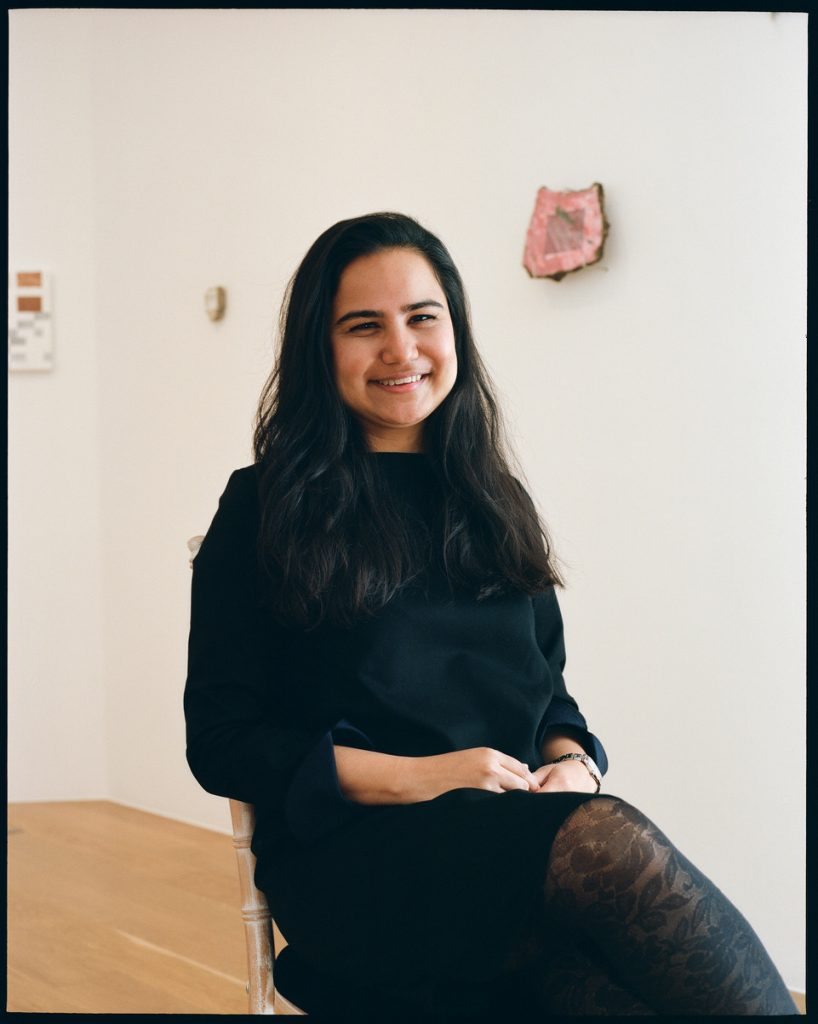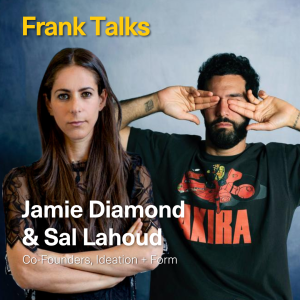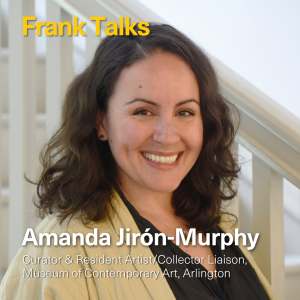In this week’s Frank Talk we chat with Ipshita Sen, the Co-Founder and Director of indigo+madder gallery in London. Ipshita has several years of experience in arts management and administration and has worked with art galleries and other art organizations in New York, London and Dubai. indigo+madder is a contemporary gallery that focuses on contemporary South Asian art and its diaspora. Ipshita earned an MA in Visual Art Administration from New York University, a second MA in History of Art and Archaeology from SOAS, University of London, and a Bachelor’s degree with Honors in Business Studies and Economics from the University of Edinburgh. We are delighted to share with you this amazing entrepreneur’s insight and advice! Enjoy the read!
What was your first job in the Arts?
I was an intern at The Iverleith House Gallery in Edinburgh in 2011, shortly before they closed.
What was the most useful or important thing you learned at that job?
How to run my own art gallery- all the planning, networking and forward thinking that goes into putting on good exhibitions. Also, most importantly, I learnt how to build and maintain relationships with different stakeholders from artists to collectors.
Tell us a little more about yourself. When did you realize you wanted to pursue a career in this industry?
I initially set out to study Economics and follow the general family trend of working in finance. However, I was always more inclined towards the arts as a child. During my time at university I interned at a few galleries and art foundations, and very early I realised that I was happiest around art. Having the business and math skills has always been particularly useful, and therefore I found myself to be more inclined towards working in the management and sales aspect of the art world.
What do you do now?
I am the Co-Founder and Director of indigo+madder a contemporary art gallery in London. indigo+madder has a special focus on contemporary art from South Asia. We organise curated exhibitions in collaboration with emerging and mid-career artists, from the region and beyond, with a view towards generating impactful cross-cultural discourse.
Where are you from?
I’m originally from Mumbai, India, however I have had the opportunity to live and work in Dubai, Edinburgh, New York and now London.
What is the arts community like there?
The Indian art market continues to have an ever-changing growth trajectory, both at an international and domestic level. The late 90’s, when I was growing up in Mumbai, saw the emergence of Indian art on a more international market with auction houses such as Christies and Sotheby’s auctioning both Modern and Contemporary Indian art. A lot more also happened on the home turf at the time as well, with the formation of new contemporary art galleries, auction houses, artist residency programs, biennales, all resulting in more exhibitions, and a steady development of quite a dynamic art ecosystem to this day.
Has where you come from shaped what you do in the arts today?
indigo+madder has a special focus on representing and working with artists who are engaged with and explore themes relevant to South Asia. So yes, my identity and heritage definitely have had a large impact on what I do today.
What is the best piece of advice you can give about working in the art world?
Don’t be scared to stand up for yourself or share a strong opinion you might have on anything. Be bold.
What is one of your greatest accomplishments in your career so far?
Setting up my own gallery with my colleague Krittika Sharma and building a market for artists we represent and work with, in London, has been my greatest accomplishment so far. I met Krittika (co-founder) at the MA in History of Art and Archaeology program at SOAS, University of London, and after together having identified a gap in the London art market for an interesting space focussed on contemporary practices from South Asia and its diaspora, we set up indigo+madder. Initially it began as a nomadic curatorial platform where we would curate independent exhibitions in spaces for a short period of time. However very early in the process we realised the importance of a permanent space and the need for continuous programming.
What has been a challenge for you?
The gallery has been, and I think, always will be a good challenge. Although lockdown owing to Coronavirus has been tough, it has also made us more resilient. It reminds us that survival is heavily dependent on one’s ability to re-adapt, re-strategize, and always be prepared for markets to change overnight. During this time, we have had to re-skill (digitally), spread risks better, and be more prepared to account for changing markets. In a way, it makes you stronger, and reminds you that we are and will always be subject to an ever changing, ever evolving world, and one must always be prepared to change and be relevant to the times that we live in.
What is something you do every day at the office (or your current home office)?
Budgeting for exhibitions, scheduling artist studio visits, constantly thinking about new ways of audience engagement, learning new skills (digitally), and stressing out a little haha
What is one of the weirdest things you have had to do on the job in your career?
Organising piles and piles of 10 years’ worth of documentation for a gallery director. The piles were scattered all over the office floor making it hard to move around easily. Was truly a nightmare, however it was a big lesson learnt on organisational skills and their importance.
What defines a good employee? What defines a good boss?
A good employee is someone who is dependable, honest and hard working. I am yet to figure out what it really takes to be a good boss!
What do you think makes a person hirable?
Being proactive and always open to learning new things.
What is your advice to making yourself stand out in your workplace? Any good tips for giving a great interview?
Dress well and have full confidence in your ability to add value.
Be positive, and the positivity will show on your face!
Is there any advice you would like to give people entering the art world?
Starting out in any career can be daunting, but it’s important to understand that every opportunity will help you grow in the field and present you with a wealth of knowledge if you look out for it. Be humble and learn as much as possible from every colleague or manager you work with.
Any other anecdotes about your working experience that you would like to share?
I think it’s important to remember that it’s good to make mistakes. Making a mistake is a great learning experience and allows you to plan better.
What is the best exhibition you have seen in the last year?
I recently visited the Art and Resistance in the American South at Turner Contemporary. Was a fantastic exhibition and I highly recommend anyone currently in the UK to visit!
If you could own a work by 5 different artists, who would be in your collection?
If I really had the budget, I would love to own work works by Nilima Sheikh, Shazia Sikander, Pieter Vermeersch, Monir Shahroudy Farmanfarmaian and William Eggleston.
How do you think art can play a fundamental role in the world’s recovery?
I don’t think I can entirely say that art can play a fundamental role in the world’s recovery, but it can definitely act as a catalyst to change things for the better. Art has the power to influence society by instigating a change in opinion, instill values, and translate experiences across space and time.
How has your current job adapted to the new virtual landscape? What do you think can be done better?
We will definitely be investing more time and resources into making exhibitions we curate more accessible to everyone (especially people who are shielding and generally vulnerable to travel to a gallery). I think online exhibitions should be as engaging virtually as they would be in person, and it is our job as a gallery to make that possible in the most efficient and effective way.




